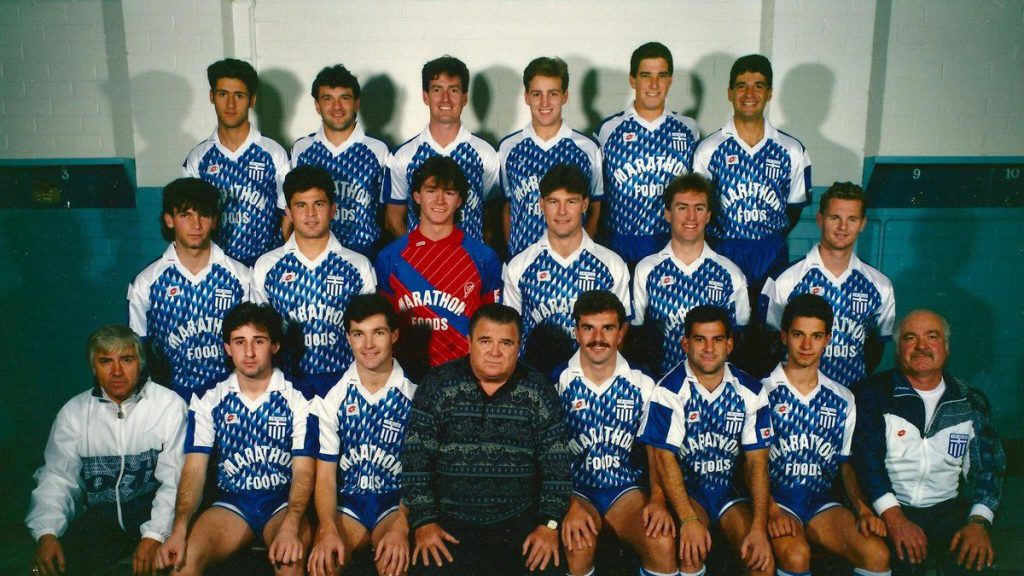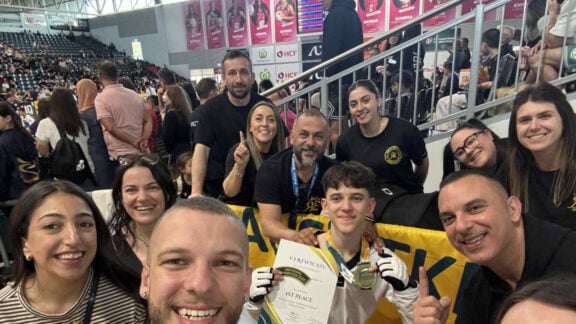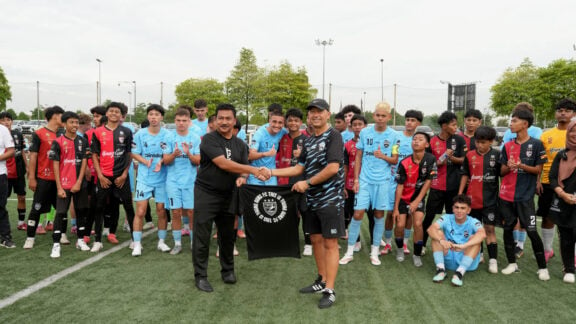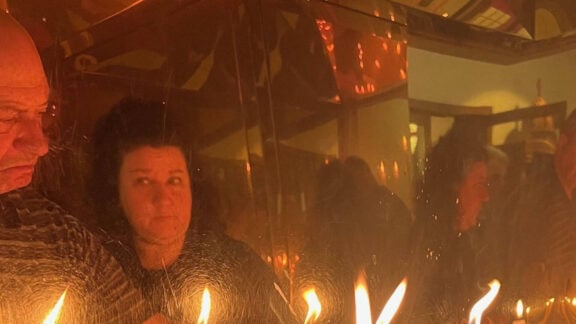Before he came to Australia, Ferenc Puskás’ coaching career was notable for taking Panathinaikos to the final of the European Cup in 1971. But his exploits as a player from 1943 to 1966 is what defines his career. A devastating left foot saw him score 511 goals in 533 top-flight appearances for Budapest Honvéd and Real Madrid. The Galloping Major’s record at international level is just as phenomenal with 84 goals in 85 games for Hungary.
But somehow Puskás – one of the greatest footballers of all time – coached South Melbourne for three successful seasons winning a National Soccer League Championship (NSL), two Dockerty Cups and the NSL Cup.
In February this year the legendary striker’s time in Australia was commemorated by a bronze statue that was unveiled in Melbourne’s Olympic Park near the spot where Puskás coached his final game for South.
Soon after, writer Paul Mavroudis said, “Puskas’ time mirrored that of those who watched him, especially those of the predominantly central and southern European migrants involved with soccer at the time – both subaltern, and existing in a parallel cultural world to that of mainstream Australia.”
And it’s this viewpoint, as well as finding out how Puskás ended up coaching in Australia from 1989 to 1992, that Wilson wants to explore in the documentary.
“That’s at the heart of our film – the idea of parallel worlds,” he tells Neos Kosmos.
“This is a story that I reckon no one outside NSL supporters know. Why does Puskás come here? Why does Hellas dream so big to get a man like that?
“You’re telling the personal history of an enigmatic figure and also a very successful figure. It’s the story of a football legend. He played in 10 Championship teams in his career. He’s played in a losing World Cup final. He’s been the FIFA Player of the Year, if there was such a thing back then, on several occasions. He’s also the centrepiece of this romantic team, the magnificent Magyars that Les Murray enthused about so many times.
“We’ve also got him at South Melbourne, a club that represents something that Melbourne is. This club, this kind of colossal migrant institution, which was one of the most important things in Greek life in the 70s, 80s and 90s. It embraced him and so we have the dual story.”
To answer these questions the documentary also wishes to show Greek migrants and their families in Melbourne at that time and how South Melbourne was important.
“You have to contextualise Puskás being at this club,” Wilson says. “People forget what the NSL was, which was, as Ange Postecoglou refers to in his book, a second church. There was church in the morning and there was church in the afternoon.
“We want to show that by the late 80s there were these families that made South Melbourne Hellas their home and that it was a respite from what was a difficult life. A life where racism wasn’t uncommon and a life where you were the ‘other’. But there were these places where you could feel at home.”
And Wilson says the support of Neos Kosmos readers is crucial in painting a picture of what it was like for Greek migrants and their families during that period.
“Certainly, we want to show South Melbourne as an entity,” he says.
“We want pictures of the markets and we want to have pictures of the factories as well as pictures and moving images of what life was like as a Greek in Melbourne in those days and what this club offered.
“There will be an importance to that, talking about the non-football stuff as well as the football stuff because I think football was a bookend in an overall story of Greek life in Australia.”
To get the stories of Puskás’ time at South Melbourne, Wilson will be interviewing several former players from the 1991 winning NSL team and one interview already in the can is Hellas legend Paul Trimboli.
“According to Paul Trimboli he loved that side,” Wilson says. “It’s Paul Wade, it’s Ange Postecoglou, it’s Steve Blair, it’s Mickey Peterson, it’s Con Boutsianis, it’s this famously attacking side along with Trimboli and Kimon Taliadoros.
“Basically, this legendary South side, and quite a young side at the time, couldn’t do what Puskás could do as a player. But at the same time, he liked their mentality and the team really responded to him.
“From all accounts he probably wasn’t a great tactician. He had very simple attacking philosophies about football. None of these endless meetings that there are today or video analysis. It was very much just get out there and play. At its heart, he unleashed belief. And he was a positive, smiley, grandfatherly figure with huge amount of aura. There was a real symbiosis and the players respected and liked what he allowed them to do, the freedom he permitted.”
Wilson also revealed that the documentary won’t be a chronology on Puskás’ career but a snapshot of who he was when he was in Australia.
“There’s obviously interesting and great things that happened to him in the 1950s and 1960s,” he says. “We don’t want to do that. We want to keep coming back to the actors in this period.”
One of the main actors was current Socceroos coach Ange Postecoglou and Wilson hopes to explore the relationship that he had with Puskás.
“Ange was close to him,” he says.
“During his time at South, Ferenc’s English was not spectacular, so he would give instructions to the team and they would be translated by the Assistant Coach who had pretty average English as well. Then it would be re-translated by Ange so you had this comic transmission of coaching instructions.
“I don’t know yet if the conclusion of the film will be of Ange’s great coaching career which was borne out of that close association with Puskás, but certainly there are similarities in terms of attacking football.”
But what about the question of how Puskás came to South Melbourne? Wilson did find out but doesn’t give the full version of how it happened. For that you will have to wait for the documentary.
“George Vassilopoulos, the South Melbourne president at the time is almost in tears remembering that first meeting with Puskás in Carlton at an Italian restaurant,” Wilson says.
“He told us all the wait staff came to get autographs and he was mobbed by every person in that restaurant.”
Wilson added, “We believe Ferenc Puskás at South Melbourne is a great story and we think it will be one of the great sporting documentaries in Australia just because it will say something about sport and life. So be a part of it and help us.
“This is a fishing mission and we think the best stuff will come from Neos Kosmos readers so if they have any photos, or videos of Puskas, we’d love people to reach out to us.”
Please email Tony Wilson at tony@tonywilson.com.au or call him on 0416 100 645 if you can assist in the making of ‘Puskás in South Melbourne’ or visit documentaryaustralia.com.au/films/4192/pusks-in-south-melbourne









